八年级英语上册《Unit 9 Can you come to my party》导学案4(无答案)(新版)人教新目标版
初中英语人教新目标八年级上册 Unit 9 Can you come to my party知识梳理

八年级英语上册Unit 9 单元知识梳理【Useful expressions】prepare for 为……做准备another time 其他时间hang out 闲逛go to the doctor 去看医生the day after tomorrow 后天the day before yesterday 前天look after 照顾,照看turn down 拒绝,调小take a trip 去旅行help out 解决问题look forward to 期待,期盼hear from sb.收到某人来信come to the party参加聚会have the flu患流感too much homework太多的家庭作业study for a test备考not…until… 直到......才......accept an invitation接受邀请at the end of this month在这个月末go to the concert去听音乐会【Target sentences】1.—Can you come to my party on Saturday afternoon?—Sure, I’d love to./ Sorry, I can’t.I have to prepare for an exam.2.—Can you go to the movies tomorrow night?—Sure.That sounds great.—I’m afraid not.I have the flu.3.—Can he go to the party?—No, he can’t.He has to help his parents.4.—Can she go to the baseball game?—No.she’s not available.She must go to the doctor.5.—Can they go to the movies?—No, they’re not free.They might have to meet their friends.6.—What’s today?—It’s Monday the 14th.7.— What day is it today?—It’s Wednesday.8.—What’s the date today?—It’s December 23rd.9.—What’s today?—It’s Wednesday the 23rd.10.I remember we went bike riding together last fall when he visited you.11.Oh, but Sam isn’t leaving until next Wednesday12.Bring Ms.Steen to the party without telling her so that she can be surprised.13.I look forward to hearing from you all.【Language points】1.prepare for an examprepare for 为……做准备prepare sth.“准备某物”,所准备的东西就是后面的宾语。
新人教版八年级英语上册Unit_9_Can_you_come_to_my_party?__Section_A-1
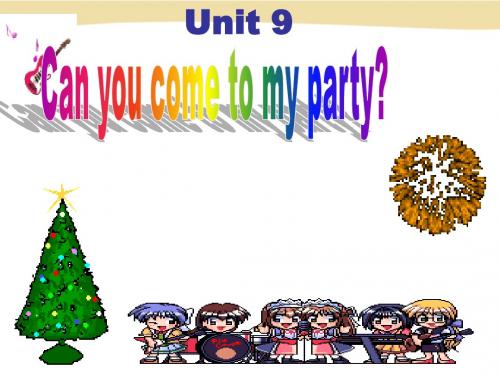
Sure, Joe. Thanks for asking.
2d Role-play the conversation.
Jeff: Hey, Nick, can you come to my house on
Saturday? My cousin Sam from Xi’an is
going to be here.
Sure, Joe. Thanks for asking.
Hey, Tom. Can you go to the movies on Saturday?
I’m sorry, I’m not available. I have to take part in the football match
That’s too bad. Maybe another time.
2a. Listen and circle can or can’t.
1. Jeff can/ can’t go to the party.
2. Mary can/ can’t go to the party. 3. May can/ can’t go to the party.
4. Mei Ling can/ can’t go to the party.
Jeff: That’s really too bad! Oh, but Sam isn’t
leaving until next Wednesday. Can you
hang out with us on Monday night?
Nick: Sure! Catch you on Monday!
Language points
Sure, I’d love to. I’m sorry, I can’t. I have to…
人教版英语八年级上册Unit 9《Can you come to my party》教学设计

人教版英语八年级上册Unit 9《Can you come to my party》教学设计一. 教材分析人教版英语八年级上册Unit 9主要讲述了关于邀请别人参加聚会的情境。
通过本单元的学习,学生能够掌握与聚会相关的词汇和表达方式,学会如何礼貌地邀请别人,并能够用英语进行简单的交流。
本单元的核心句型是“Can you come to my party?”,以及回答“Yes, I can.”和“No, I can’t.”。
二. 学情分析八年级的学生已经具备了一定的英语基础,能够听懂并运用简单的英语进行交流。
他们对学习英语有浓厚的兴趣,并且愿意积极参与课堂活动。
然而,部分学生可能在口语表达和听力方面还存在一定的困难,需要教师的引导和帮助。
三. 教学目标1.知识目标:学生能够掌握与聚会相关的词汇和表达方式,学会如何礼貌地邀请别人,并能够用英语进行简单的交流。
2.能力目标:学生能够听懂并运用核心句型“Can you come to my party?”进行交流,提高口语表达能力。
3.情感目标:学生能够在课堂上积极参与,培养合作意识和团队精神。
四. 教学重难点1.重点:学生能够听懂并运用核心句型“Can you come to my party?”进行交流。
2.难点:学生能够正确使用情态动词“can”来表达自己的能力。
五. 教学方法1.情境教学法:通过创设真实的聚会情境,激发学生的学习兴趣,提高他们的口语表达能力。
2.交际法:通过小组讨论和角色扮演等方式,培养学生的合作意识和团队精神。
3.任务型教学法:通过完成各种任务,引导学生主动参与学习过程,提高他们的自主学习能力。
六. 教学准备1.教学材料:教材、多媒体课件、录音机、磁带或音频文件。
2.教学环境:教室布置成聚会场景,悬挂气球、彩带等装饰物。
七. 教学过程1.导入(5分钟)教师以提问的方式引导学生回顾已学过的与聚会相关的词汇,如“birthday party”、“house party”等。
八年级英语上册 Unit 9 Can you come to my party?单元知识归纳
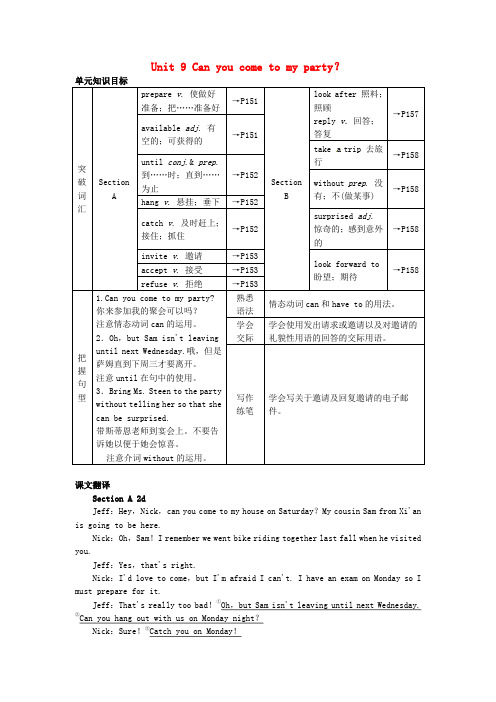
Unit 9 Can you come to my party?a课文翻译Section A 2dJeff:Hey,Nick,can you come to my house on Saturday?My cousin Sam from Xi'an is going to be here.Nick:Oh,Sam!I remember we went bike riding together last fall when he visited you.Jeff:Yes,that's right.Nick:I'd love to come,but I'm afraid I can't. I have an exam on Monday so I must prepare for it.Jeff:That's really too bad!①Oh,but Sam isn't leaving until next Wednesday.②Can you hang out with us on Monday night?Nick:Sure!③Catch you on Monday!杰夫:嘿,尼克,星期六你能来我家吗?我来自西安的表弟萨姆打算到这儿。
尼克:哦,萨姆!我记得去年秋天他来看你时,我们一起骑自行车旅行过。
杰夫:是的,很对。
尼克:我想去,但是恐怕不行。
星期一我有一次考试,所以我必须为此而准备。
杰夫:那真是太糟糕了!哦,但是萨姆直到下周三才要离开。
你可以在周一晚上和我们去闲逛吗?尼克:当然可以了!周一见你们!知识详解1.—Jenny,can you come to my party on Saturday afternoon?詹妮,星期六下午你能来参加我的聚会吗?—Sure,I'd love to.当然,我很愿意。
【解读】本句是一般疑问句。
新人教版八年级英语上册复习短语笔记资料Unit 9 Can you come to my party
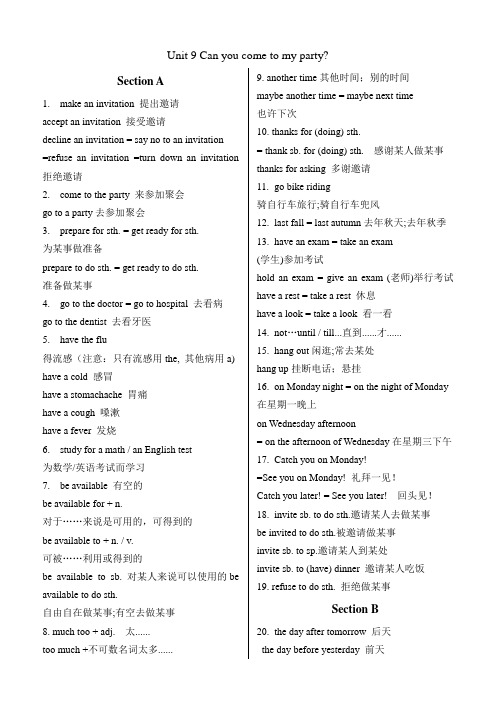
Unit 9 Can you come to my party?Section A1. make an invitation 提出邀请accept an invitation 接受邀请decline an invitation = say no to an invitation=refuse an invitation =turn down an invitation 拒绝邀请2. come to the party 来参加聚会go to a party去参加聚会3. prepare for sth. = get ready for sth.为某事做准备prepare to do sth. = get ready to do sth.准备做某事4. go to the doctor = go to hospital 去看病go to the dentist 去看牙医5. have the flu得流感(注意:只有流感用the, 其他病用a) have a cold 感冒have a stomachache 胃痛have a cough 嗓漱have a fever 发烧6. study for a math / an English test为数学/英语考试而学习7. be available 有空的be available for + n.对于……来说是可用的,可得到的be available to + n. / v.可被……利用或得到的be available to sb. 对某人来说可以使用的be available to do sth.自由自在做某事;有空去做某事8. much too + adj. 太......too much +不可数名词太多...... 9. another time其他时间;别的时间maybe another time = maybe next time也许下次10. thanks for (doing) sth.= thank sb. for (doing) sth. 感谢某人做某事thanks for asking 多谢邀请11. go bike riding骑自行车旅行;骑自行车兜风12. last fall = last autumn去年秋天;去年秋季13. have an exam = take an exam(学生)参加考试hold an exam = give an exam (老师)举行考试have a rest = take a rest 休息have a look = take a look 看一看14. not…until / till...直到......才......15. hang out闲逛;常去某处hang up挂断电话;悬挂16. on Monday night = on the night of Monday 在星期一晚上on Wednesday afternoon= on the afternoon of Wednesday在星期三下午17. Catch you on Monday!=See you on Monday! 礼拜一见!Catch you later! = See you later! 回头见!18. invite sb. to do sth.邀请某人去做某事be invited to do sth.被邀请做某事invite sb. to sp.邀请某人到某处invite sb. to (have) dinner 邀请某人吃饭19. refuse to do sth. 拒绝做某事Section B20. the day after tomorrow 后天the day before yesterday 前天the year before last year 前年last year 去年this year 今年next year 明年the year after next year 后年21. have a piano lesson 上钢琴课22. on weekdays = from Monday to Friday在工作日on weekends 在周末this weekend这个周末last weekend上个周末next weekend下个周末23. look after = take care of 照顾;照料look after sb. well = take good care of sb.好好照顾;好好照料24. help sb. with sth. = help sb. (to) do sth.帮助某人做某事with one ’ s help = with the help of sb.在某人的帮助之下help out (with sth.)帮助摆脱困境/克服困难help sb. out帮助某人解决问题或摆脱困境25. see sb. do sth.看到某人做了某事(强调看见某人做过某事)see sb. doing sth.看到某人正在做某事(强调看见某人正在做某事)26. take a trip = go on / for a trip 去旅行take a trip to sp. = go to sp. for a trip到某地去旅行27. at the end of... 在......的末端;在......的尽头at the end of this month 在这个月月底at the end of the road 在路的尽头28. be glad / happy to do sth.很高兴做某事29. by +时间点到......为止by now到现在为止by this Friday到这个星期五之前为止30. be surprised 感到惊讶be surprised at sth.对某事感到很惊讶be surprised to do sth.惊讶地做某事31. think of想出;想起;认为think about考虑;思考think over好好考虑;深思熟虑32. bring sb. / sth. to sp. 带某人/某物到某地33. so that 为了;以便34. look forward to doing sth.期待做某事;盼望做某事35. hear from sb. = get / receive a letter from sb. 收到某人的来信hear about / of sth. / sb. 听说某事/某人36. plan a housewarming party策划一个乔迁聚会plan a party for sb.为某人策划一个聚会have a surprise party办一场惊喜聚会;开惊喜聚会at the party在聚会上37. make it成功;胜利(表示通过努力或经历困难后取得成功、完成某事)38. reply in writing以书面的形式进行回复reply to these letters回复这些来信reply to the question=make a reply to the question=answer the question 回答问题39. go to a concert去听音乐会give a concert开音乐会40. go to the movies = go to see a film=go to the cinema 去看电影。
人教新目标八年级上册英语《Unit 9 Can you come to my party?》Sect
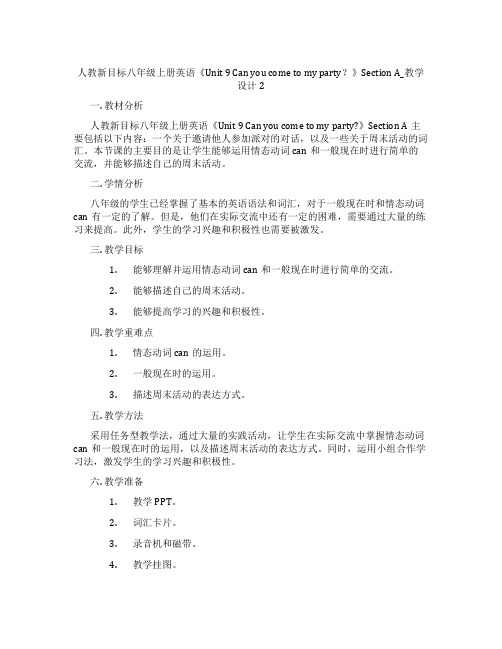
人教新目标八年级上册英语《Unit 9 Can you come to my party?》Section A_教学设计2一. 教材分析人教新目标八年级上册英语《Unit 9 Can you come to my party?》Section A主要包括以下内容:一个关于邀请他人参加派对的对话,以及一些关于周末活动的词汇。
本节课的主要目的是让学生能够运用情态动词can和一般现在时进行简单的交流,并能够描述自己的周末活动。
二. 学情分析八年级的学生已经掌握了基本的英语语法和词汇,对于一般现在时和情态动词can有一定的了解。
但是,他们在实际交流中还有一定的困难,需要通过大量的练习来提高。
此外,学生的学习兴趣和积极性也需要被激发。
三. 教学目标1.能够理解并运用情态动词can和一般现在时进行简单的交流。
2.能够描述自己的周末活动。
3.能够提高学习的兴趣和积极性。
四. 教学重难点1.情态动词can的运用。
2.一般现在时的运用。
3.描述周末活动的表达方式。
五. 教学方法采用任务型教学法,通过大量的实践活动,让学生在实际交流中掌握情态动词can和一般现在时的运用,以及描述周末活动的表达方式。
同时,运用小组合作学习法,激发学生的学习兴趣和积极性。
六. 教学准备1.教学PPT。
2.词汇卡片。
3.录音机和磁带。
4.教学挂图。
七. 教学过程1.导入(5分钟)通过播放一段关于派对的音频,引导学生谈论派对,激发学生的学习兴趣。
2.呈现(10分钟)利用PPT展示本节课的主要内容,包括对话和词汇。
让学生跟读对话,熟悉词汇。
3.操练(15分钟)将学生分成小组,每组分配一张词汇卡片,让学生用情态动词can和一般现在时进行交流,描述卡片上的词汇。
教师巡回指导,纠正发音和语法错误。
4.巩固(10分钟)让学生在小组内互相提问,用情态动词can和一般现在时描述自己的周末活动。
教师巡回指导,纠正发音和语法错误。
5.拓展(10分钟)让学生自由发挥,用情态动词can和一般现在时编写一段对话,描述自己和他的朋友的周末活动。
Unit9Can you come to my party 词汇及情态动词讲解-人教版八年级英语上册
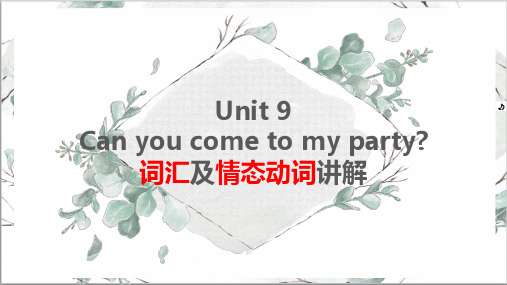
1. —____________ I try on those shoes in the window?
—_______________. They are just on show.
A. Could; Yes, you can
B. Can; Sorry, you couldn’t
number.
—Sure. Here it is.
A. Can
B. Need
C. Might
D. Must
Must提问时的否定回答
—Must I go home now? —Yes, you must.
needn’t. No, you
don’t have to. Must提问时否定回答 用 needn’t 或 don’t/doesn’t have to.
Unit 9 Can you come to my party?
词汇及情态动词讲解
词汇 练习 语法 综合练习
目录
1. invite v. 邀请 invitation n. 邀请 invite sb. to do sth. 邀请某人做某事
Eg: Hehua invites us to watch the soap opera. Guo invited Qin to drink, but he turned him down..
Task 2 单选
( ) 1.Julie didn't leave office _____the police arrived.
A. however B. whenever C. while D. until
( ) 2.My friend invited me _____the art club, and I
人教版八年级上册英语 Unit 9 Can you come to my party? 单元拓展阅读
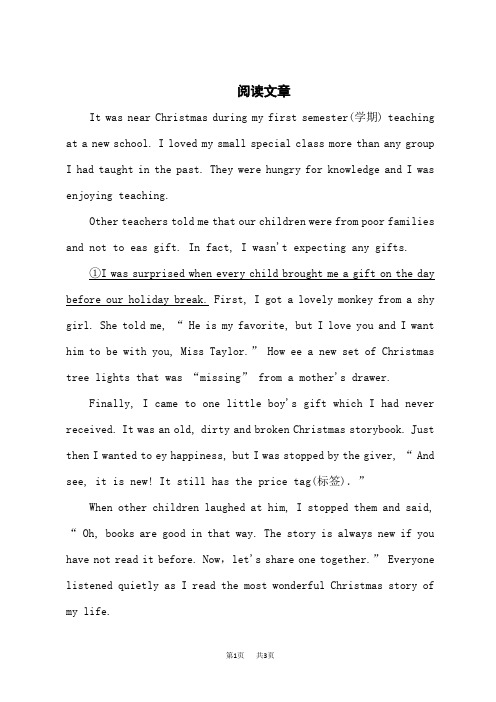
阅读文章It was near Christmas during my first semester(学期) teaching at a new school. I loved my small special class more than any group I had taught in the past. They were hungry for knowledge and I was enjoying teaching.Other teachers told me that our children were from poor families and not to eas gift. In fact, I wasn't expecting any gifts.①I was surprised when every child brought me a gift on the day before our holiday break. First, I got a lovely monkey from a shy girl. She told me, “ He is my favorite, but I love you and I want him to be with you, Miss Taylor.” How ee a new set of Christmas tree lights that was “missing” from a mother's drawer.Finally, I came to one little boy's gift which I had never received. It was an old, dirty and broken Christmas storybook. Just then I wanted to ey happiness, but I was stopped by the giver, “ And see, it is new! It still has the price tag(标签).”When other children laughed at him, I stopped them and said, “ Oh, books are good in that way. The story is always new if you have not read it before. Now,let's share one together.” Everyone listened quietly as I read the most wonderful Christmas story of my life.I still keep those Christmas gifts.②它们总让我想起可爱的孩子们。
人教版八年级英语上册unit 9 Can you come to my party单词讲解课件

refuse /rɪ'fju:z/ v.拒绝
refuse sb. refuse to do sth.
拒绝 yesterday 前天
the day after tomorrow 后天
weekday /ˈwi:kdeɪ/ n.工作日 (星期一至星期五的任何一天)
一封邀请函
an invitation
an invitation to … turn down 拒绝
……的邀请 还可指“调低(音量)”
turn down an invitation
reply /rɪ'plaɪ/ v.回答;回复
reply to sb. reply to sth.
回复sb. 回应sth.
Unit 9 Can you come to my party?
单词讲解
prepare for 为……做准备
= get/be ready for
exam /ɪɡ'zæm/ n.(=examination)考试
一场考试
an exam
have/take an exam 参加考试
pass the exam
hang /hæŋ/ v.(hung /hʌŋ/)悬挂;垂下
Hang the picture on the wall,please.
hang out 闲逛;常去某处 hang out with friends 和朋友一起闲逛 hang 用作动词 “吊死,绞死”时,其过去式为hanged
catch /kætʃ/ v.及时赶上;接住 ;抓住 第三人称单数:catches 过去式:caught Catch you tomorrow.=See you tomorrow. 明天见。
八年级英语上册 Unit 9 Can you come to my party语法总结 同步写作指导

一、英语中,常见表示“请求”句型:
1.用“please + 动词原形”或“动词原形 + please”,
即在普通祈使句中加上please,使语气变得委婉。
比如:Please have a glass of milk.请喝杯牛奶。
2.用“Will you(please)+ 动词原形……?”结构,用于
Please let me know by this Friday if you can come to the party. Yours, Liu Yu
第9页
写作亮点: 1.在信件开篇,不忘寒暄问候,再礼貌地发出邀请,诚意 满满。 2.时间、地点及人物交代准确且清楚,让人一目了然。 step3检验修改 1.围绕所给材料组织内容,确定主要短语,句式等。(2分) 2.写作中注意语义通顺,符合逻辑关系。上下文之间能够 适当使用连接词。(2分)
第二人称表示向对方提出试探性提议或有礼貌请求。
比如:Will you help me with my English?
请帮我
学习英语好吗?
3.用“Can / May / Could /Might + 主语 + 动词原
形……?”结构。其中could,might不表示过去时间,而是
比can,may更委婉客气。
第3页
第4页
【话题剖析】 本单元围绕“发出、接收或拒绝邀请”而展开。在日常生活 中,我们经常会邀请他人参加某项活动,话题较常见。当我 们向他人发出邀请时,一定要注意语气委婉。当他人向你发 出邀请时,你假如拒绝邀请,语气也应礼貌。惯用表示: 1.Can you come to my party on Saturday afternoon? 2.I'm sorry,I can't…/I have to… 3.Thanks for… 4.I am looking forward to… 5.We'd like to invite you to…
新人教版八年级英语上册Unit_9_Can_you_come_to_my_party?__Self check

(2)这4个情态动词在一般疑问句中将它们
放在句首, 在否定句中直接在他们后边加not
即可。
我们以can为例: Can he go with us? 他能和我们一起去吗? He can’t go with us.
他不能和我们一起去。
而“have to”要句。
2. I have to help my parents. 我不得不帮助我的父母。 help sb. with sth. 或help sb. (to) do sth. 上一句我们可以说: I have to help my parents with the housework. 或说I have to help my parents (to) do the housework.
Unit 9
Explanation
1. 情态动词“have to”与其他的情态动词如: “can” “may” “must”和 “should” 不同。 (1)这4个情态动词没有人称的变化,而 have to有。它的第三人称单数为“has to” 如:
He should study hard. 他应该好好学习。 He has to study hard. 他不得不好好学习。
A. am not A. on B. can't B. at C. don't C. in
A 3. What are you doing _____ Monday morning?
4. Thanks for _______ me to the party. B A. ask B. asking C. asks 5. Bob can’t come out to play because he C _________ help Dad in the garden. A. can B. can’t C. has to 6. —Would you like a cup of coffee? B —____________. A. No, I don’t want C. I don’t like it B. No, thank you
八年级上册unit9 can you come to my party
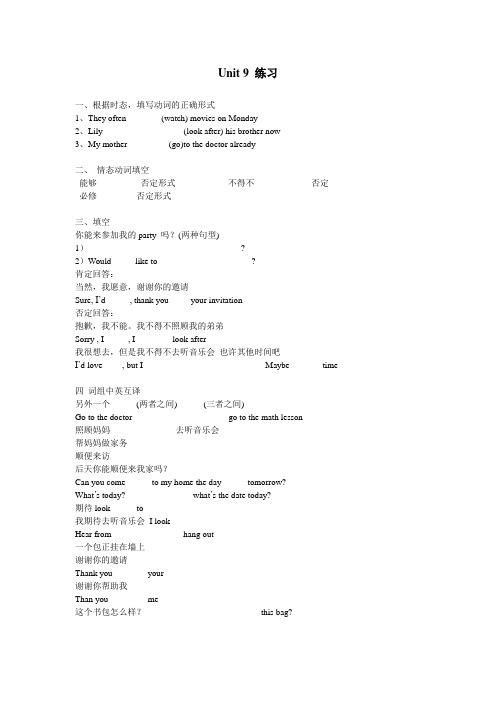
Unit 9 练习一、根据时态,填写动词的正确形式1、They often________(watch) movies on Monday2、Lily __________________(look after) his brother now3、My mother _________(go)to the doctor already二、情态动词填空能够_________ 否定形式________ 不得不_____________否定___________ 必修_________否定形式_________三、填空你能来参加我的party 吗?(两种句型)1)___________________________________?2)Would _____like to _____________________?肯定回答:当然,我愿意,谢谢你的邀请Sure, I’d _____, thank you ____ your invitation否定回答:抱歉,我不能。
我不得不照顾我的弟弟Sorry , I _____, I ________look after____________我很想去,但是我不得不去听音乐会也许其他时间吧I’d love ____, but I ___________________________ Maybe _______time四词组中英互译另外一个______(两者之间)______(三者之间)Go to the doctor____________________ go to the math lesson__________________ 照顾妈妈______________ 去听音乐会_________________________________帮妈妈做家务_____________________________________________________顺便来访________________________后天你能顺便来我家吗?Can you come _____ to my home the day _____ tomorrow?What’s today?_______________ what’s the date today?__________________期待look _____ to我期待去听音乐会I look ___________________________________________ Hear from________________ hang out____________________一个包正挂在墙上______________________________________________谢谢你的邀请Thank you _______ your ________谢谢你帮助我Than you ________ me这个书包怎么样?__________________________ this bag?。
人教版英语八年级上册Unit 9听力原文及翻译
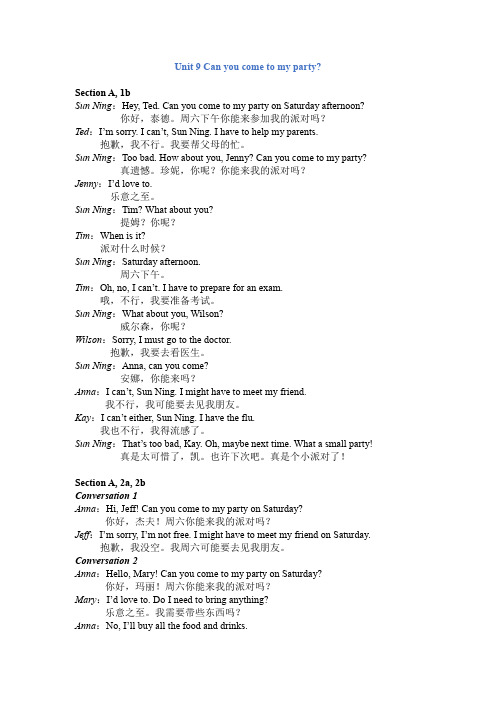
Unit 9 Can you come to my party?Section A, 1bSun Ning:Hey, Ted. Can you come to my party on Saturday afternoon?你好,泰德。
周六下午你能来参加我的派对吗?Ted:I’m sorry. I can’t, Sun Ning. I have to help my parents.抱歉,我不行。
我要帮父母的忙。
Sun Ning:Too bad. How about you, Jenny? Can you come to my party?真遗憾。
珍妮,你呢?你能来我的派对吗?Jenny:I’d love to.乐意之至。
Sun Ning:Tim? What about you?提姆?你呢?Tim:When is it?派对什么时候?Sun Ning:Saturday afternoon.周六下午。
Tim:Oh, no, I can’t. I have to prepare for an exam.哦,不行,我要准备考试。
Sun Ning:What about you, Wilson?威尔森,你呢?Wilson:Sorry, I must go to the doctor.抱歉,我要去看医生。
Sun Ning:Anna, can you come?安娜,你能来吗?Anna:I can’t, Sun Ning. I might have to meet my friend.我不行,我可能要去见我朋友。
Kay:I can’t either, Sun Ning. I have the flu.我也不行,我得流感了。
Sun Ning:That’s too bad, Kay. Oh, maybe next time. What a small party!真是太可惜了,凯。
也许下次吧。
真是个小派对了!Section A, 2a, 2bConversation 1Anna:Hi, Jeff! Can you come to my party on Saturday?你好,杰夫!周六你能来我的派对吗?Jeff:I’m sorry, I’m not free. I might have to meet my friend on Saturday.抱歉,我没空。
八年级英语上册 Unit 9 Can you come to my party短语、语法知识点汇总 (新版)人教新目标版
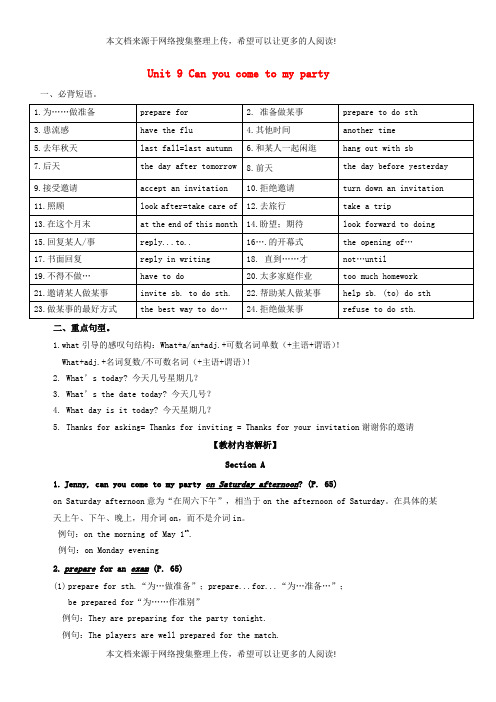
Unit 9 Can you come to my party一、必背短语。
二、重点句型。
1.what引导的感叹句结构:What+a/an+adj.+可数名词单数(+主语+谓语)!What+adj.+名词复数/不可数名词(+主语+谓语)!2. What’s today?今天几号星期几?3. What’s the date today?今天几号?4. What day is it today? 今天星期几?5. Thanks for asking= Thanks for inviting = Thanks for your invitation谢谢你的邀请【教材内容解析】Section A1.Jenny, can you come to my party on Saturday afternoon? (P. 65)on Saturday afternoon意为“在周六下午”,相当于on the afternoon of Saturday。
在具体的某天上午、下午、晚上,用介词on,而不是介词in。
例句:on the morning of May 1st.例句:on Monday evening2.prepare for an exam (P. 65)(1)prepare for sth.“为…做准备”;prepare...for...“为…准备…”;be prepared for“为……作准别”例句:They are preparing for the party tonight.例句:The players are well prepared for the match.(2)exam作名词,表示“考试”,take/have an exam参加考试。
例句:We will take the final exam next week.3.I’m sorry. I’m not available. (P. 66)available作形容词,表示“有空的、可利用的”,常用作表语,相当于free。
人教版八年级英语上册《nit 9 Can you come to my party. Section A .3a—3c》优质课教案_19
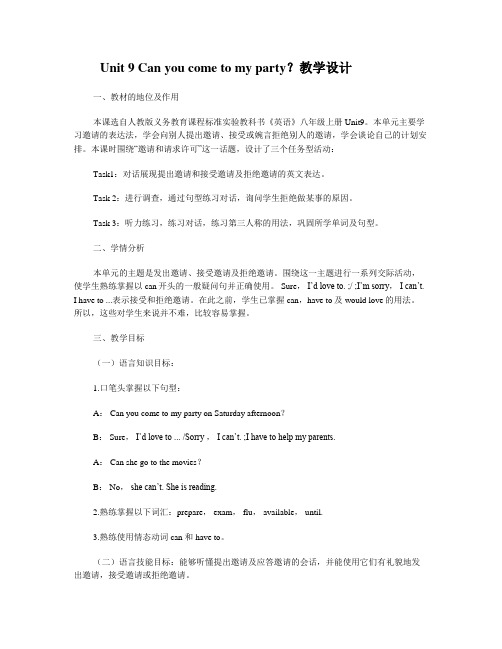
Unit 9 Can you come to my party?教学设计一、教材的地位及作用本课选自人教版义务教育课程标准实验教科书《英语》八年级上册Unit9。
本单元主要学习邀请的表达法,学会向别人提出邀请、接受或婉言拒绝别人的邀请,学会谈论自己的计划安排。
本课时围绕“邀请和请求许可”这一话题,设计了三个任务型活动:Task1:对话展现提出邀请和接受邀请及拒绝邀请的英文表达。
Task 2:进行调查,通过句型练习对话,询问学生拒绝做某事的原因。
Task 3:听力练习,练习对话,练习第三人称的用法,巩固所学单词及句型。
二、学情分析本单元的主题是发出邀请、接受邀请及拒绝邀请。
围绕这一主题进行一系列交际活动,使学生熟练掌握以can开头的一般疑问句并正确使用。
Sure,I’d love to. ;/ ;I’m sorry,I can’t.I have to ...表示接受和拒绝邀请。
在此之前,学生已掌握can,have to及would love的用法。
所以,这些对学生来说并不难,比较容易掌握。
三、教学目标(一)语言知识目标:1.口笔头掌握以下句型:A: Can you come to my party on Saturday afternoon?B: Sure,I’d love to ... /Sorry ,I can’t. ;I have to help my parents.A: Can she go to the movies?B: No,she can’t. She is reading.2.熟练掌握以下词汇:prepare, exam, flu, available, until.3.熟练使用情态动词 can 和have to。
(二)语言技能目标:能够听懂提出邀请及应答邀请的会话,并能使用它们有礼貌地发出邀请,接受邀请或拒绝邀请。
(三)情感态度:培养学生有礼貌地与他人交往的能力。
四、教学重、难点(一)教学重点:1. 运用所学提出邀请,接受邀请和拒绝邀请。
人教版八年级上册第九单元知识点全八上unit9知识点
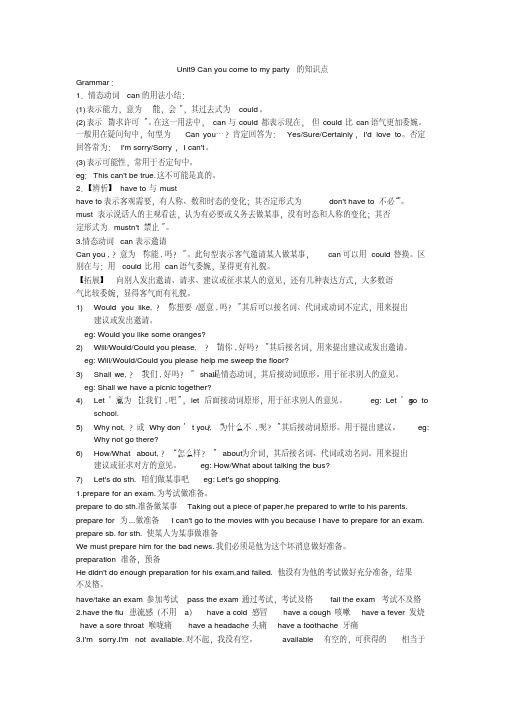
Unit9 Can you come to my party的知识点Grammar:1.情态动词can的用法小结:(1)表示能力,意为“能,会”,其过去式为could。
(2)表示“请求许可”。
在这一用法中,can与could都表示现在,但could比can语气更加委婉。
一般用在疑问句中,句型为Can you…?肯定回答为:Yes/Sure/Certainly,I'd love to。
否定回答常为:I'm sorry/Sorry,I can't。
(3)表示可能性,常用于否定句中。
eg:This can't be true.这不可能是真的。
2.【辨析】have to与must不必”。
have to表示客观需要,有人称、数和时态的变化;其否定形式为don't have to“must表示说话人的主观看法,认为有必要或义务去做某事,没有时态和人称的变化;其否定形式为mustn't“禁止”。
3.情态动词can表示邀请Can you ,?意为“你能,吗?”。
此句型表示客气邀请某人做某事,can可以用could替换。
区别在与:用could比用can语气委婉,显得更有礼貌。
【拓展】向别人发出邀请、请求、建议或征求某人的意见,还有几种表达方式,大多数语气比较委婉,显得客气而有礼貌。
1)Would you like,?“你想要/愿意,吗?”其后可以接名词、代词或动词不定式,用来提出建议或发出邀请。
eg: Would you like some oranges?2)Will/Would/Could you please,?“请你,好吗?”其后接名词,用来提出建议或发出邀请。
eg: Will/Would/Could you please help me sweep the floor?3)Shall we,?“我们,好吗?”shall是情态动词,其后接动词原形。
用于征求别人的意见。
- 1、下载文档前请自行甄别文档内容的完整性,平台不提供额外的编辑、内容补充、找答案等附加服务。
- 2、"仅部分预览"的文档,不可在线预览部分如存在完整性等问题,可反馈申请退款(可完整预览的文档不适用该条件!)。
- 3、如文档侵犯您的权益,请联系客服反馈,我们会尽快为您处理(人工客服工作时间:9:00-18:30)。
Unit 9 Can you come to my party第四课时 Section B (2a—2d)学习目标1.能记住并能正确运用下列词汇:invitation, reply, forward, delete, print, sad, goodbye, take a trip, glad, preparation, glue, without, surprised, look forward to, housewarming.2.重点句型:(1)Thanks so much for planning this. (2) Let me know if you need my help. (3)I look forward to hearing from you all.课时重点学会用书面的方式发出邀请或接受和拒绝邀请。
预习导学----不看不讲一、填一填1.制作一份请柬 ___________________2.去旅行 __________________________3.举行一个惊喜聚会 _______________4.盼望 ___________________5.没有说再见__________________6.到本周五为止__________________7.提高我的英语________________ 8.到本月末______________________9.送别他_______________________ 10.收到某人的来信____________________二、译一译1.What a great idea! ________________2. Thanks so much for __________________3. help out with any of the party preparations _____________________4.I’m sad to see her go __________________________________5. Let me know if you need my help._____________________________________.合作探究--------不议不讲Task:1情景对话Teacher: Good morning/ afternoon/ evening, boys and girls. What are you doing next week? Students: _____________________________________________________________________. Teacher: I’m busy these days. Do you know what I’m doing these days? Now look at the calendar on Page68 in SectionB. Let’s together.Task2:完成教材上2a—2d的任务1. 预习交流,检查预习效果,讨论2a.2. 小组内交流合作完成2b.2c.a. 学生组内朗读单词。
b. 略读课文,完成2b.2c.Task2:1. 扩展延伸了解邀请函的写作,小组内合作完成2d.2.抽部分小组在全班同学前面展示他们做内的作品。
导学测评一、根据句意及首字母提示补全单词。
1. Thanks a lot for your i_________. But I have to stay at home.2. I’m sorry I can’t visit you. Because I’m r______ busy.3. We shouldn’t play computer games on w_______.4. He is coming back s______.5. Please r______ to the invitation by Friday.6. She is very s______ , because her mother is ill.7. I went to school w______ having br eakfast this morning.8. I’m g______ to hear tha t you can come to the party.9. She will be s______ if we have a surprise party for her.10. We can help with some of the party p________.二、单项选择。
( ) 1. I’m sad _____ her go, and this party is the best way ______ goodbye.A. see, sayB. to see, sayC. to see, to sayD. see, to say( ) 2. I have a great idea about _____.A. what to do thatB. how to doC. how can doD. how to do that( ) 3. The boy does well in all his .He is a good student.A. lessonB. lessonsC. classD. classes( ) 4. He can’t come to the party. He stay at home.A. hasB. have C .has to D. have to( ) 5. Listen! Helen is singing in the next room.It be Helen. She has gone to Beijing.A. mayB. can’t C mustn’t D. should( ) 6. I want you up but I can’t your number.A. call; knowB. to call; knowsC. to call; look forD. to call; find( ) 7. Thanks a lot helping me my English.A. to; inB. to; withC. for; inD. for; with( ) 8. —_______ tomorrow?—It’s Friday the 5 th.A. WhatB. What’sC. when isD. What day is( ) 9. -What are you going to do for vacation?-I plan ______ my uncl e in Hong Kong.A. visitingB. to visitC. visitD. visits( ) 10. Thanks a lot for ____me____ your birthday party.A. invite forB. invite toC. inviting forD. inviting to三、根据汉语提示完成句子。
1. 我真的非常喜欢李老师。
I ______ ______ Mr Li ______ ______.2. 我的家人准备在这个月末去武汉度假。
My family ______ ______ ______ ______ ______Wuhan ______ ______ ______ ______this month.3. 如果你需要我的帮助让我知道。
Let me know if ______ ______ ______ ______>4. 我将仍然高兴帮助聚会的任何一项准备工作。
I’ll still ______ ______ ______ help out with ______ ______ ______ ______ ______ .5. 我们将在下个星期五为她举行一个惊喜聚会。
We’ll ______ ______ ______ ______ for her next Friday.6. 我盼望收到你的来信。
I ______ ______ ______ ______ ______ you all.7. 我们正在计划一个乔迁聚会。
We are ______ ______ ______ ______.知识超市1、Bring Ms.Steen to the party without telling her so that she can be surprised. 事先别告诉Ms.Steen,就把她带过来以便给她一个惊喜。
a. without意为“没有”,作介词,后跟名词、代词或动名词。
例如:There is no fire without smoke. 无风不起浪。
b. so that 意为“以便于;为了”,引导目的状语从句。
常与can, could, will, would等情态动词连用。
例如:Lucy got up early this morning so that she could have a good breakfast.c. SurpriseSurprise 作及物动词,“使惊奇,使意外”,后跟“人”作宾语。
构成短语surprise sb.2、I look forward to hearing from you all. 我盼望着收到大家的回信。
a. look forward to sth./ doing sth. 意为“盼望某事或盼望作某事”。
此处的to是介词。
故后面要接动名词形式。
例如: The girl looked forward to getting a new bike on her birthday.b. heard from sb .意为“收到某人的来信”。
例如: Did you heard from your son last month?3、excuse me与 sorry(1) excuse me是会话时常用的客套话,常用在句首,有“劳驾,请问,请原谅,对不起,打扰了”等意思 eg:Excuse me. Are you Mr Black?Excuse me. Where is the bus stop? Excuse me. I don’t agree with you.(2)sorry(I’m sorry.)是说错话,做错事,认错人等之后,向对方致歉的用语,其答语是“That’s all right.”“Not at all.”“Never mind.”“It doesn’t matter.”等。
